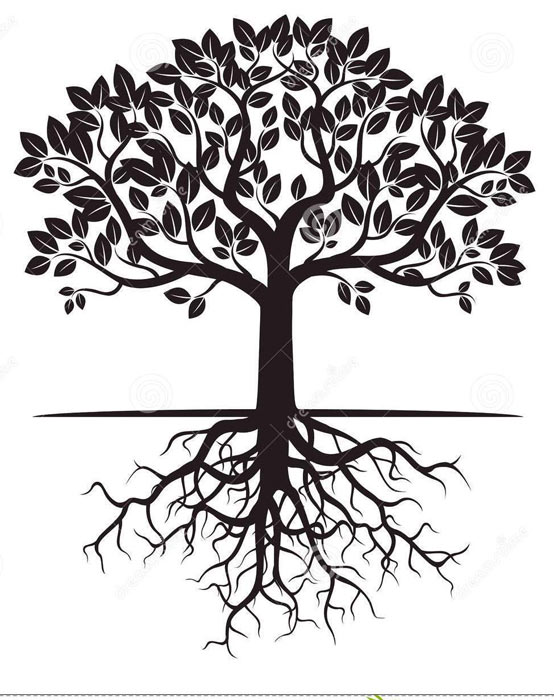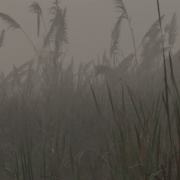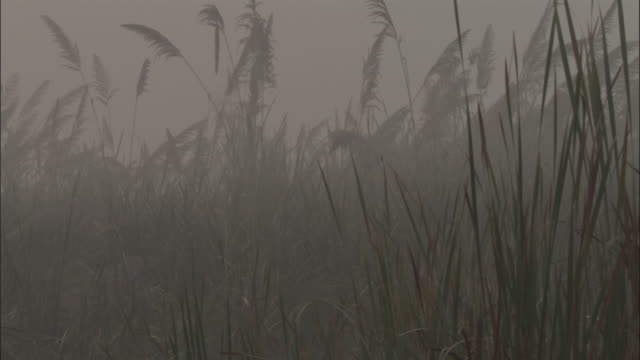MONTHLY BLOG 122, PROPOSED ROOTS PROJECT FOR TEENAGERS
If citing, please kindly acknowledge copyright © Penelope J. Corfield (2021)

|
Line Drawing of Tree & Roots: |
It’s important for individuals to know about their personal roots, Humans all live in Time-Space (also known as the Space-Time continuum).1 And knowing a bit about personal family roots helps to locate people in their own individual spot in history and geography.
So this short essay speculates about a possible School Roots Project for children in their mid-teens. (Perhaps in a Civics class; or a part of a contemporary History course). The aim is not in any way to encourage family- bragging, whether for ‘lofty’ aristocratic lineage or for ‘authentic’ proletarian roots. Instead, the value is chiefly for the individuals concerned, to know more about themselves – and to have the chance to talk seriously about their roots with parents/ grandparents/ influential family members/ and/or any others who played a significant role in their upbringings.
Clearly teachers need to organise all such Roots Projects with great sensitivity. Not all families are happy ones. Not all older relatives will be at ease talking about the past with people of a younger generation. And thoughtful arrangements have to be made for students who are adopted, who may know little or nothing about their biological background – but who share the same human need to be socially well rooted in Time-Space. Indeed, it can well be argued that those whose position is, outwardly at least, relatively unsettled have the greatest need for this exercise in rooting, both with their adoptive families and/or with their biological families, if they can be traced.2
The more that individuals know about their personal background, the more secure they feel – the more they understand their connections with others – the better their sense of self-esteem – and the more they feel in control of their own lives. Rootedness is a prime indicator of emotional health and happiness. And the more that people are secure in their own skin, the better they can relate to others.3 They can simultaneously see their own role as part of a wider human history, set in unfolding Time which links the generations.
What then should a Roots Project for teenagers entail? The details are best left to be specified by teachers who know the relevant age-group. There’s no magic formula. Just a desire to get children talking to their parents/ grandparents/ or any other significant figures in their upbringing. At infant school level, there are many good storybooks about families; and there are projects which invite children to ask grandparents (say) simple questions, such as ‘What sort of toys did you have as a child?’ For teenagers, the discussion can be more probing – but may be hampered by years of not talking about personal matters. Therefore Projects should start modestly: asking children which adults influenced them as they grew? And then asking the youngsters to think of questions to ask the grownups in their lives?
Students should also be briefed on asking for family help with their Roots Projects. It must be stressed that all information will be used exclusively by the students. These talks will not be ‘on the record’ – here contrasting with what can happen to taped interviews as the result of formal Oral History exercises.4 Instead, the Roots Projects are intended as launch-pads for informal chats, enabling the students to write a short account of one or more significant adults who influenced their upbringing.
Afterwards, the class can be invited to share their experiences of the process. Some families will already be talkers. Others not. In every case, there is always more to be learned. Did the students find it easy or difficult to get the adults to talk? If difficult, why was that? Was it that they themselves were embarrassed? Or the parents shy? Did the talking exercise make things any easier? Did they learn anything surprising? What might they ask next time that they have a family chat? To stress again, the exercise is not a competitive exercise in bragging about comparative social backgrounds. Instead, it is an exercise in Rooting – taking specific steps in what may become a longer series of family discussions.
Generally, it’s very common for people to exclaim, at the demise of a parent, grandparent or any other significant relative or carer: ‘I wish I’d asked them more about themselves, when they were alive to tell me’. Death locks the doors to personal memories of a shared past. Rooting Projects help to open the conversations while all the protagonists are alive to relate their own histories.
ENDNOTES:
1 Whether the chosen terminology is Time-Space or Space-Time, the proposition is the same: that Time and Space are integrally yoked. For further discussion, see P.J. Corfield, Time and the Shape of History (2007), pp. 15, 9-11, 17-18, 218, 220, 248-52; and PJC current research-in-progress.
2 See e.g. J. Rees, Life Story Books for Adopted Children: A Family-Friendly Approach (2009); J. Waterman and others, Adoption-Specific Therapy: A Guide to Helping Adopted Children and their Families Thrive (Washington DC, 2018); A. James, The Science of Parenting Adopted Children: A Brain-Based, Trauma-Informed Approach to Cultivating Your Child’s Social, Emotional and Moral Development (2019).
3 R. Coleman, ‘Why We Need Family History Now More than Ever’, FamilySearch, 26 Sept. 2017: https://www.familysearch.org/blog/en/family-history-2/
4 Oral History, professionally undertaken, provides a wonderful set of original resources for historical studies: among a huge literature, see e.g. A. Zusman, Story Bridges: A Guide for Conducting Intergenerational Oral History Projects (2016); F-A. Montoya and B. Allen, Practising Oral History to Connect University to Community (2018). These Schools Rooting Projects can be regarded as early stepping stones in the same process of tapping into the powers of the human memory – and sharing them with others.
For further discussion, see Twitter
To read other discussion-points, please click here
To download Monthly Blog 122 please click here



